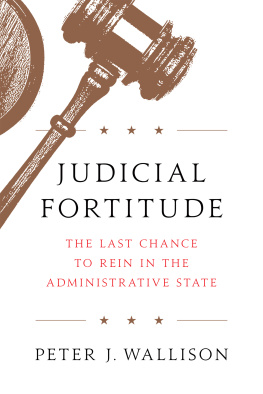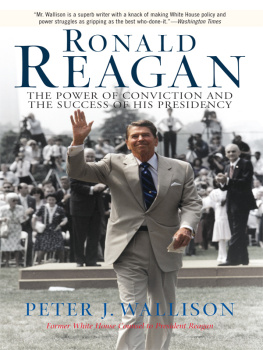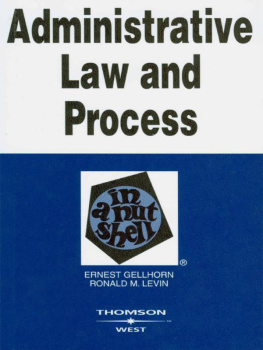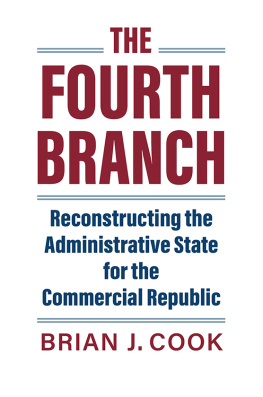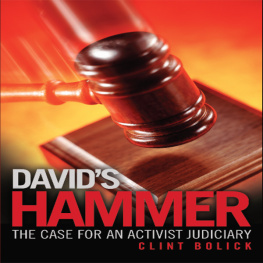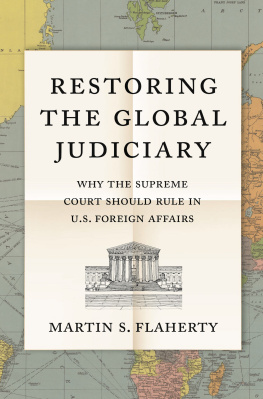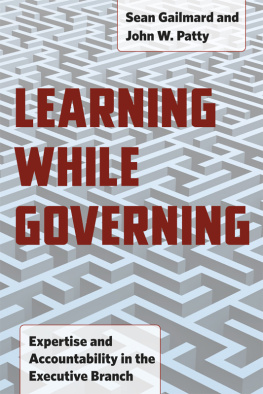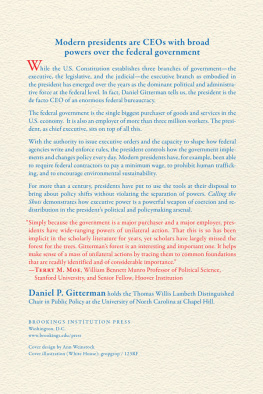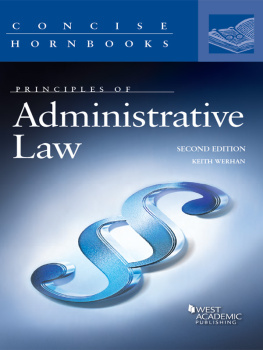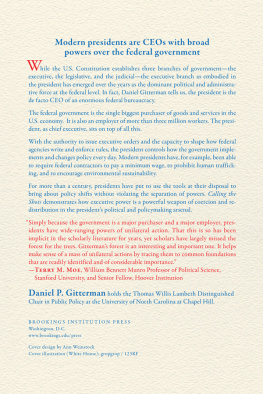
It is easy to see, that it would require an uncommon portion of fortitude in the judges to do their duty as faithful guardians of the Constitution, where legislative invasions of it had been instigated by the major voice of the community.
Alexander Hamilton, Federalist No. 78
JUDICIAL FORTITUDE
The Last Chance to Rein in
the Administrative State
Peter J. Wallison

New York London
2018 by Peter J. Wallison
All rights reserved. No part of this publication may be reproduced, stored in a retrieval system, or transmitted, in any form or by any means, electronic, mechanical, photocopying, recording, or otherwise, without the prior written permission of Encounter Books, 900 Broadway, Suite 601, New York, New York, 10003.
First American edition published in 2018 by Encounter Books, an activity of Encounter for Culture and Education, Inc., a nonprofit, tax exempt corporation.
Encounter Books website address: www.encounterbooks.com
Manufactured in the United States and printed on acid-free paper. The paper used in this publication meets the minimum requirements of ANSI/NISO Z39.48-1992
(R 1997) (Permanence of Paper).
FIRST AMERICAN EDITION
LIBRARY OF CONGRESS CATALOGING-IN-PUBLICATION DATA
Names: Wallison, Peter J.
Title: Judicial fortitude : the last chance to rein in the administrative state / by Peter J. Wallison.
Description: New York : Encounter Books, 2018. |
Includes bibliographical references and index.
Identifiers: LCCN 2018011248 (print) | LCCN 2018012291 (ebook) |
ISBN 9781641770095 (ebook) | ISBN 9781641770088 (hardcover : alk. paper)
Subjects: LCSH: Judicial review of administrative actsUnited States. |
Separation of powersUnited States. |
United StatesPolitics and government.
Classification: LCC KF5425 (ebook) | LCC KF5425 .W35 2018 (print) |
DDC 347.73/12dc23
LC record available at https://lccn.loc.gov/2018011248
Interior page design and composition: BooksByBruce.com
Dedication
To Justice Clarence Thomas, who has consistently seen the danger to our Constitution in the erosion of the separation of powers. As he wrote in 2015:
We have too long abrogated our duty to enforce the separation of powers required by our Constitution. We have overseen and sanctioned the growth of an administrative system that concentrates the power to make laws and the power to enforce them in the hands of a vast and unaccountable administrative apparatus that finds no comfortable home in our constitutional structure. The end result may be trains that run on time (although I doubt it), but the cost is to our Constitution and the individual liberty it protects.
CONTENTS
INTRODUCTION
It is not too much to say that we risk losing our democracy unless we can gain control of the agencies of the administrative state. Rulemaking by unelected officials, with little congressional or judicial oversight, affects the lives of Americans in profound ways, but we have failed thus far to develop an effective strategy for controlling it. Congress has not been able to place limits on the growth of administrative power, and the courts have made the problem worse by requiringin the 1984 decision Chevron v. NRDCthat lower courts defer to agencies interpretations of their own statutory authorities. In this way, the judiciary has largely surrendered its constitutional duty to determine the scope of administrative discretion.
This is not the Framers design. They structured a tripartite system of separated powers in which each branch of the government had an assigned but limited role. Congress was to be the exclusive source of legislation; the president was to execute the laws made by Congress; and the judiciary was to keep the elected branchesCongress and the presidentwithin their designated areas of responsibility.
The Judiciarys Unique Role
In Federalist No. 78, Alexander Hamilton describes the crucial duty of the judiciary in the new constitutional system, and whyto properly fulfill that dutyjudges must have life tenure:
If the courts of justice are to be considered as the bulwarks of a limited Constitution against legislative encroachments, this consideration will afford a strong argument for the permanent tenure of judicial offices, since nothing will contribute so much to this as that independent spirit in the judges, which must be essential to the
The judiciarys position as the guardians of the Constitution received additional support from Chief Justice John Marshall in the foundational decision Marbury v. Madison, issued in 1803. There, he not only established that the Supreme Court could declare acts of Congress unconstitutional but also set out an equally important role for the judiciary: It is emphatically the province and duty of the Judicial Department to say what the law is.
These principles, as the Framers intended, placed the judiciary in a special position to decide the two issues essential to the separation of powers in the Constitution: first, whether Congress, in derogation of its exclusive constitutional role as legislator, has delegated its legislative power to the president or an agency of the executive branch; and, second, whether an administrative agency has exceeded the statutory authority it was granted by Congress.
Whether the result of timidity, adherence to precedent, or simply the difficulty of carrying out their unique role in the Framers structure, the courts have largely failed to fulfill these responsibilities. And thismore than anything elsehas contributed to the growth of the administrative state. In this book, I show not only that the Framers expected the judiciary to keep the other branches within their assigned roles, but also that the proper performance of that role is the only effective way to rein in the administrative state.
The separation of powers, outlined in , is a unique feature of the U.S. Constitution. The Framers believed, from their study of history and political philosophy, that when the king (or any executive) controls the legislature or the courtsor when the legislature controls both the making and enforcing of the lawsthe peoples liberties are inevitably threatened. It is only when these three parts of a governmentthe legislature, the executive, and the judiciaryare kept independent of one another that liberty can be assured.
In 1787, after two years of debate by representatives from the original thirteen states, a draft constitution was submitted to the people for ratification. During the next two years, the Framers sought the publics support, which they finally won in 1788, when nine states had ratified.
Although protecting liberty was the Framers stated objective, it was closely linked to the creation of a representative democracy. In the Framers political theory, which followed John Lockes Second Treatise of Government, the peopleby ratifying the Constitutiontransferred to the new government their inherent right to govern themselves. Congress, with the exclusive authority under the Constitution to make the laws, would be elected by and act on behalf of the people. Neither the president nor any administrative agency could act other than with the authority of the Constitution or a law enacted by Congress.
As shown in , in many instances administrative agencies appear to have issued rules or interpreted their authority in ways that exceeded the powers they were given by Congress, but the courts have not intervened. Yet an administrative rule that exceeds the authority conferred by Congress is unconstitutional legislation, and when issued by an agency of the executive branch it represents exactly the combination of executive and legislative power that the Framers feared.
Next page
